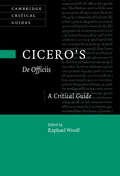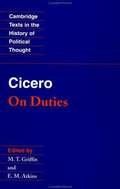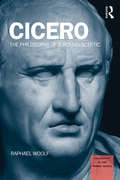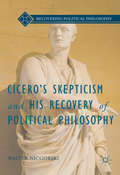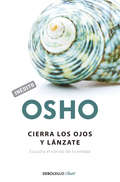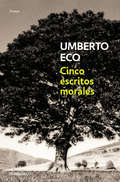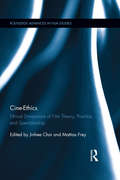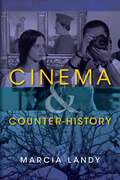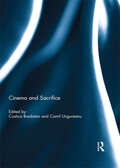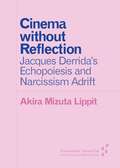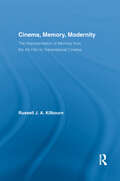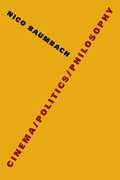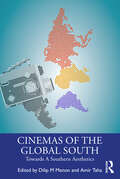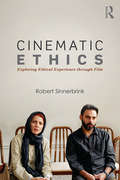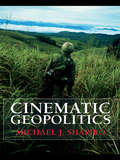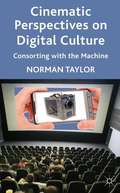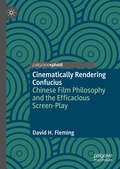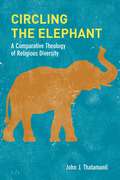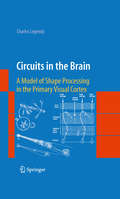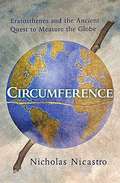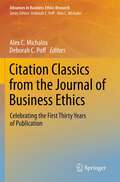- Table View
- List View
Cicero's ‘De Officiis': A Critical Guide (Cambridge Critical Guides)
by Raphael WoolfCicero's De Officiis, perhaps his most influential philosophical work, ranges over a wide variety of themes, from the role of the family in society to the question of whether our duties can conflict with one another, and from the moral significance of offence to the question of whether it is right to kill a dictator. This Critical Guide, the first collection of essays devoted to the work, is helpfully organised in thematic sections and aims to illuminate both the main individual topics of De Officiis and their interconnections, with essays by an international team of contributors that will allow readers to appreciate the work's distinctive blend of philosophical theory and social and political reality. It will be valuable for a range of readers in fields including philosophy, classics and political theory.
Cicero: On Duties
by Marcus Tullius CiceroDe Officiis (On Duties) was Cicero's last philosophical work. In it he made use of Greek thought to formulate the political and ethical values of Roman Republican society as he saw them, revealing incidentally a great deal about actual practice. Writing at a time of political crisis after the assassination of Julius Caesar in 44BC, when it was not clear how much of the old Republican order would survive, Cicero here handed on the insights of an elder statesman, adept at political theory and practice, to his son, and through him, to the younger generation in general. De Officiis has often been treated merely as a key to the lost Greek works that Cicero used. This volume aims to render De Officiis, which was such an important influence on later masterpieces of Western political thought, more intelligible by explaining its relation to its own time and place. A wholly new translation is accompanied by a lucid introduction and all the standard features of Cambridge Texts in the History of Political Thought, including a chronology, select bibliography, and notes on the vocabulary and significant individuals mentioned in the text.
Cicero: On Moral Ends
by Julia AnnasThis 2001 translation makes one of the most important texts in ancient philosophy available to modern readers. Cicero is increasingly being appreciated as an intelligent and well-educated amateur philosopher, and in this work he presents the major ethical theories of his time in a way designed to get the reader philosophically engaged in the important debates. Raphael Woolf's translation does justice to Cicero's argumentative vigour as well as to the philosophical ideas involved, while Julia Annas's introduction and notes provide a clear and accessible explanation of the philosophical context of the work. This edition will appeal to all readers interested in this central text in ancient philosophy and the history of ethics.
Cicero: The Philosophy of a Roman Sceptic (Philosophy in the Roman World)
by Raphael WoolfCicero’s philosophical works introduced Latin audiences to the ideas of the Stoics, Epicureans and other schools and figures of the post-Aristotelian period, thus influencing the transmission of those ideas through later history. While Cicero’s value as documentary evidence for the Hellenistic schools is unquestioned, Cicero: The Philosophy of a Roman Sceptic explores his writings as works of philosophy that do more than simply synthesize the thought of others, but instead offer a unique viewpoint of their own. In this volume Raphael Woolf describes and evaluates Cicero’s philosophical achievements, paying particular attention to his relation to those philosophers he draws upon in his works, his Romanizing of Greek philosophy, and his own sceptical and dialectical outlook. The volume aims, using the best tools of philosophical, philological and historical analysis, to do Cicero justice as a distinctive philosophical voice. Situating Cicero’s work in its historical and political context, this volume provides a detailed analysis of the thought of one of the finest orators and writers of the Roman period. Written in an accessible and engaging style, Cicero: The Philosophy of a Roman Sceptic is a key resource for those interested in Cicero’s role in shaping Classical philosophy.
Cicero’s De Finibus
by Julia Annas Gábor BeteghCicero is increasingly recognised as a highly intelligent contributor to the ongoing ethical debates between Epicureans, Stoics and other schools. In this work on the fundamentals of ethics his learning as a scholar, his skill as a lawyer and his own passion for the truth result in a work which dazzles us in its presentation of the debates and at the same time exhibits the detachment of the ancient sceptic. Many kinds of reader will find themselves engaged with Cicero as well as with the ethical theories he presents. This collection takes the reader further into the debates, opening up new avenues for exploring this fascinating work.
Cicero’s Skepticism and His Recovery of Political Philosophy (Recovering Political Philosophy)
by Walter NicgorskiThis book explores Cicero’s moral and political philosophy with great attention to his life and thought as a whole. The author “thinks through” Cicero with a close reading of his most important philosophical writings. Nicgorski often resolves apparent tensions in Cicero’s thought that have posed obstacles to the appreciation of his practical philosophy. Some of the major tensions confronted are those between his Academic skepticism and apparent Stoicism, between his commitment to philosophy and to politics, rhetoric and oratory, and between his attachment to Greek philosophy and his profound engagement in Roman culture. Moreover, the key theme within Cicero’s writings is his intended recovery, within his Roman context, of both the Socratic focus on great questions of practical philosophy and Socratic skepticism. Cicero’s recovery of Socratic political philosophy in Roman garb is then the basis for recovery of Cicero as a notable political thinker relevant to our time and its problems.
Cierra los ojos y lánzate
by Osho OshoEl mundo exterior es inseguro e inestable, y son muchas las tribulaciones que nos causa. Para dar con nuestro camino, Osho nos propone que hagamos oídos sordos a los mensajes engañosos que nos llegan del exterior y aprendamos a escuchar la verdad que reside en el interior de cada uno de nosotros, pues cada ser humano nace con la verdad en su interior, pero los azares de la vida hacen que la olvidemos. Con su amena maestría, Osho nos enseña a desdeñar las distracciones terrenales y a reconocer la voz sincera de nuestra conciencia.
Cinco escritos morales
by Umberto EcoPor qué la guerra ha pasado a ser hoy día inviable; las características y vigencia del fascismo; los cambios de la prensa ante la presencia de la televisión; los fundamentos y la posibilidad de una ética laica, y la tolerancia e intolerancia ante la migración que hará de Europa en los próximos años un continente multirracial.
Cine-Ethics: Ethical Dimensions of Film Theory, Practice, and Spectatorship (Routledge Advances in Film Studies)
by Jinhee Choi Mattias FreyThis volume looks at the significance and range of ethical questions that pertain to various film practices. Diverse philosophical traditions provide useful frameworks to discuss spectators’ affective and emotional engagement with film, which can function as a moral ground for one’s connection to others and to the world outside the self. These traditions encompass theories of emotion, phenomenology, the philosophy of compassion, and analytic and continental ethical thinking and environmental ethics. This anthology is one of the first volumes to open up a dialogue among these diverse methodologies. Contributors bring to the fore some of the assumptions implicitly shared between these theories and forge a new relationship between them in order to explore the moral engagement of the spectator and the ethical consequences of both producing and consuming films
Cinema Illuminating Reality: Media Philosophy through Buddhism
by Victor FanA new critical approach to cinema and media based on Buddhism as a philosophical discourse How can a philosophical discourse generated in Asia help us reframe and renew cinema and media theory? Cinema Illuminating Reality provides a possible way to do this by using Buddhist ideas to examine the intricate relationship between technicity and consciousness in the cinema. The resulting dialogue between Buddhism and Euro-American philosophy is the first of its kind in film and media studies.Victor Fan examines cinema&’s ontology and ontogenetic formation and how such a formational process produces knowledge, political agency, and in-aesthetics. Buddhism allows Fan to deconstruct binary thinking and reimagine media as an ecology, rethinking cinema in relational terms between the human and the machine. Along the way, Fan considers a wide variety of case studies from around the globe, while paying special attention to how contemporary Tibeto-Sinophone filmmakers have adopted relational thinking to detail ways of rebuilding a world that appears to be beyond repair.From Chinese queer cinema to a reexamination of Japanese master Ozu&’s work and its historical reception to Christian Petzold&’s 2018 existential thriller Transit, CinemaIlluminating Reality forges a remarkable path between Buddhist studies and cinema studies, casting vital new light on both of these important subjects.
Cinema and Counter-History
by Marcia LandyDespite claims about the end of history and the death of cinema, visual media continue to contribute to our understanding of history and history-making. In this book, Marcia Landy argues that rethinking history and memory must take into account shifting conceptions of visual and aural technologies. With the assistance of thinkers such as Gilles Deleuze and Félix Guattari, Cinema and Counter-History examines writings and films that challenge prevailing notions of history in order to explore the philosophic, aesthetic, and political stakes of activating the past. Marshaling evidence across European, African, and Asian cinema, Landy engages in a counter-historical project that calls into question the certainty of visual representations and unmoors notions of a history firmly anchored in truth.
Cinema and Sacrifice (Angelaki: New Work in the Theoretical Humanities)
by Costica Bradatan and Camil UngureanuCinema has a long history of engaging with the theme of sacrifice. Given its capacity to stimulate the imagination and resonate across a wide spectrum of human experiences, sacrifice has always attracted filmmakers. It is on screen that the new grand narratives are sketched, the new myths rehearsed, and the old ones recycled. Sacrifice can provide stories of loss and mourning, betrayal and redemption, death and renewal, destruction and re-creation, apocalypses and the birth of new worlds.The contributors to this volume are not just scholars of film but also students of religion and literature, philosophers, ethicists, and political scientists, thus offering a comprehensive and interdisciplinary approach to the relationship between cinema and sacrifice. They explore how cinema engages with sacrifice in its many forms and under different guises, and examine how the filmic constructions, reconstructions and misconstructions of sacrifice affect society, including its sacrificial practices.This book was originally published as a special issue of Angelaki: journal of the theoretical humanities.
Cinema without Reflection: Jacques Derrida’s Echopoiesis and Narcissim Adrift (Forerunners: Ideas First)
by Akira Mizuta LippitCinema without Reflection traces an implicit film theory in Jacques Derrida&’s oeuvre, especially in his frequent invocation of the myth of Echo and Narcissus. Derrida&’s reflections on the economies of image and sound that reverberate in this story, along with the spectral dialectics of love, mirrors, and poiesis, serve as the basis for a theory of cinema that Derrida perhaps secretly imagined. Following Derrida&’s interventions on Echo and Narcissus across his thought on the visual arts, Akira Mizuta Lippit seeks to return to a theory of cinema adrift in Derrida&’s philosophy. Forerunners is a thought-in-process series of breakthrough digital works. Written between fresh ideas and finished books, Forerunners draws on scholarly work initiated in notable blogs, social media, conference plenaries, journal articles, and the synergy of academic exchange. This is gray literature publishing: where intense thinking, change, and speculation take place in scholarship.
Cinema, Memory, Modernity: The Representation of Memory from the Art Film to Transnational Cinema (Routledge Advances in Film Studies #6)
by Russell J.A. KilbournSince its inception, cinema has evolved into not merely a ‘reflection’ but an indispensable index of human experience – especially our experience of time’s passage, of the present moment, and, most importantly perhaps, of the past, in both collective and individual terms. In this volume, Kilbourn provides a comparative theorization of the representation of memory in both mainstream Hollywood and international art cinema within an increasingly transnational context of production and reception. Focusing on European, North and South American, and Asian films, Kilbourn reads cinema as providing the viewer with not only the content and form of memory, but also with its own directions for use: the required codes and conventions for understanding and implementing this crucial prosthetic technology — an art of memory for the twentieth-century and beyond.
Cinema/Politics/Philosophy (Film and Culture Series)
by Nico BaumbachAlmost fifty years ago, Jean-Louis Comolli and Jean Narboni published the manifesto “Cinema/Ideology/Criticism,” helping to set the agenda for a generation of film theory that used cinema as a means of critiquing capitalist ideology. In recent decades, film studies has moved away from politicized theory, abandoning the productive ways in which theory understands the relationship between cinema, politics, and art. In Cinema/Politics/Philosophy, Nico Baumbach revisits the much-maligned tradition of seventies film theory to reconsider: What does it mean to call cinema political?In this concise and provocative book, Baumbach argues that we need a new philosophical approach that sees cinema as both a mode of thought and a form of politics. Through close readings of the writings on cinema by the contemporary continental philosophers Jacques Rancière, Alain Badiou, and Giorgio Agamben, he asks us to rethink both the legacy of ideology critique and Deleuzian film-philosophy. He explores how cinema can condition philosophy through its own means, challenging received ideas about what is seeable, sayable, and doable. Cinema/Politics/Philosophy offers fundamental new ways to think about cinema as thought, art, and politics.
Cinemas of the Global South: Towards a Southern Aesthetics
by Amir Taha Dilip M MenonThis book engages with the idea of the Global South through cinema as a concept of resistance; as a space of decolonialisation; and as an arena of virtuality, creativity and change. It opens up a dialogue amongst scholars and filmmakers from the Global South: India, Nigeria, Colombia, Brazil, South Africa, and Egypt.The essays in the volume approach cinema as an intertwined process of both production and perception not divorced from the economic, social, political and cultural. They emphasise film as a visual medium where form, structure and content are not separable. Through a wide array of film-readings, the authors explore the concept of a southern cinematic esthetics, in particular, and the concept of the Global South in general.The volume will be of interest to scholars, students and researchers of film and media studies, critical theory, cultural studies and Global South studies.
Cinematic Ethics: Exploring Ethical Experience through Film
by Robert SinnerbrinkHow do movies evoke and express ethical ideas? What role does our emotional involvement play in this process? What makes the aesthetic power of cinema ethically significant? Cinematic Ethics: Exploring Ethical Experience through Film addresses these questions by examining the idea of cinema as a medium of ethical experience with the power to provoke emotional understanding and philosophical thinking. In a clear and engaging style, Robert Sinnerbrink examines the key philosophical approaches to ethics in contemporary film theory and philosophy using detailed case studies of cinematic ethics across different genres, styles, and filmic traditions. Written in a lucid and lively style that will engage both specialist and non-specialist readers, this book is ideal for use in the academic study of philosophy and film. Key features include annotated suggestions for further reading at the end of each chapter and a filmography of movies useful for teaching and researching cinematic ethics.
Cinematic Geopolitics
by Michael J. ShapiroIn recent years, film has been one of the major genres within which the imaginaries involved in mapping the geopolitical world have been represented and reflected upon. In this book, one of America's foremost theorists of culture and politics treats those aspects of the "geopolitical aesthetic" that must be addressed in light of both the post cold war and post 9/11 world and contemporary film theory and philosophy. Beginning with an account of his experience as a juror at film festival’s, Michael J. Shapiro’s Cinematic Geopolitics analyzes the ways in which film festival space and both feature and documentary films function as counter-spaces to the contemporary "violent cartography" occasioned by governmental policy, especially the current "war on terror." Influenced by the cinema-philosophy relationship developed by Gilles Deleuze and the politics of aesthetics thinking of Jacques Ranciere, the book’s chapters examines a range of films from established classics like the Deer Hunter and the Battle of Algiers to contemporary films such as Dirty Pretty Things and the Fog of War. Shapiro’s use of philosophical and theoretical works makes this cutting edge examination of film and politics essential reading for all students and scholars with an interest in film and politics.
Cinematic Perspectives on Digital Culture
by Norman TaylorExploring research into mobile phone use as props to subjective identity, Norman Taylor employs concepts from Michelle Foucault, Gilles Deleuze and actor network theory to discuss the affect of mechanisms of make-believe, from celebrity culture to avatar-obsessed game players, and digital culture.
Cinematically Rendering Confucius: Chinese Film Philosophy and the Efficacious Screen-Play
by David H. FlemingCinematically Rendering Confucius marks the first book-length enquiry into China’s first two big screen treatments of arguably the best-known and most influential thinker in world history: Confucius. By interweaving methods drawn from Film Studies, Comparative Philosophy, and Media Archaeology in response to broader calls to deepen and thicken the scope and purview of film philosophical enquiry, this trailblazing book grounds Fei Mu’s 1940 patriotic art film Kǒng Fūzǐ and Hu Mei's 2010 “Huallywood” blockbuster Kǒngzǐ as pre- and postsocialist examples of Chinese politico-philosophical filmmaking that straddle the PRC’s revolutionary Marxist socio-political experiment. After exploring the geopolitics surrounding why Confucius has been historically included and excluded from the European classification of “philosopher” and addressing the difficulties that entering into “Chinese Thought” presents to non-natives, the book’s first half undertakes a deep dive into the history of (re)mediating the Confucian image-imagination. Arguing that Confucius might be a form of film philosopher avant la lettre, we thereafter explore repetitions and differences surrounding the ever-changing treatment and representation of Confucius on-screen—concluding with a look at the latest AI-infused theory-film When Marx Met Confucius (2023).
Circles Disturbed: The Interplay of Mathematics and Narrative
by Barry Mazur Apostolos DoxiadisWhy narrative is essential to mathematicsCircles Disturbed brings together important thinkers in mathematics, history, and philosophy to explore the relationship between mathematics and narrative. The book's title recalls the last words of the great Greek mathematician Archimedes before he was slain by a Roman soldier—"Don't disturb my circles"—words that seem to refer to two radically different concerns: that of the practical person living in the concrete world of reality, and that of the theoretician lost in a world of abstraction. Stories and theorems are, in a sense, the natural languages of these two worlds—stories representing the way we act and interact, and theorems giving us pure thought, distilled from the hustle and bustle of reality. Yet, though the voices of stories and theorems seem totally different, they share profound connections and similarities.A book unlike any other, Circles Disturbed delves into topics such as the way in which historical and biographical narratives shape our understanding of mathematics and mathematicians, the development of "myths of origins" in mathematics, the structure and importance of mathematical dreams, the role of storytelling in the formation of mathematical intuitions, the ways mathematics helps us organize the way we think about narrative structure, and much more.In addition to the editors, the contributors are Amir Alexander, David Corfield, Peter Galison, Timothy Gowers, Michael Harris, David Herman, Federica La Nave, G.E.R. Lloyd, Uri Margolin, Colin McLarty, Jan Christoph Meister, Arkady Plotnitsky, and Bernard Teissier.
Circling the Elephant: A Comparative Theology of Religious Diversity (Comparative Theology: Thinking Across Traditions #8)
by John J. ThatamanilChristian theologians have for some decades affirmed that they have no monopoly on encounters with God or ultimate reality and that other religions also have access to religious truth and transformation. If that is the case, the time has come for Christians not only to learn about but also from their religious neighbors. Circling the Elephant affirms that the best way to be truly open to the mystery of the infinite is to move away from defensive postures of religious isolationism and self-sufficiency and to move, in vulnerability and openness, toward the mystery of the neighbor.Employing the ancient Indian allegory of the elephant and blind(folded) men, John J. Thatamanil argues for the integration of three often-separated theological projects: theologies of religious diversity (the work of accounting for why there are so many different understandings of the elephant), comparative theology (the venture of walking over to a different side of the elephant), and constructive theology (the endeavor of re-describing the elephant in light of the other two tasks).Circling the Elephant also offers an analysis of why we have fallen short in the past. Interreligious learning has been obstructed by problematic ideas about “religion” and “religions,” Thatamanil argues, while also pointing out the troubling resonances between reified notions of “religion” and “race.” He contests these notions and offers a new theory of the religious that makes interreligious learning both possible and desirable.Christians have much to learn from their religious neighbors, even about such central features of Christian theology as Christ and the Trinity. This book envisions religious diversity as a promise, not a problem, and proposes a new theology of religious diversity that opens the door to robust interreligious learning and Christian transformation through encountering the other.
Circuits in the Brain: A Model of Shape Processing in the Primary Visual Cortex
by Charles LegéndyDr. Charles Legéndy's Circuits in the Brain: A Model of Shape Processing in the Primary Visual Cortex is published at a time marked by unprecedented advances in experimental brain research which are, however, not matched by similar advances in theoretical insight. For this reason, the timing is ideal for the appearance of Dr. Legéndy's book, which undertakes to derive certain global features of the brain directly from the neurons. Circuits in the Brain, with its "relational firing" model of shape processing, includes a step-by-step development of a set of multi-neuronal networks for transmitting visual relations, using a strategy believed to be equally applicable to many aspects of brain function other than vision. The book contains a number of testable predictions at the neuronal level, some believed to be accessible to the techniques which have recently become available. With its novel approach and concrete references to anatomy and physiology, the monograph promises to open up entirely new avenues of brain research, and will be particularly useful to graduate students, academics, and researchers studying neuroscience and neurobiology. In addition, since Dr. Legéndy's book succeeds in achieving a clean logical presentation without mathematics, and uses a bare minimum of technical terminology, it may also be enjoyed by non-scientists intrigued by the intellectual challenge of the elegant devices applied inside our brain. The book is uniquely self-contained; with more than 120 annotated illustrations it goes into full detail in describing all functional and theoretical concepts on which it builds.
Circumference: Eratosthenes and the Ancient Quest to Measure the Globe
by Nicholas NicastroHow do you measure the size of the planet you're standing on? "Circumference" is the story of what happened when one man asked himself that very question. Nicholas Nicastro brings to life one of history's greatest experiments when an ancient Greek named Eratosthenes first accurately determined the distance around the spherical earth. In this fascinating narrative history, Nicastro takes a look at a deceptively simple but stunning achievement made by one man, millennia ago, with only the simplest of materials at his disposal. How was he able to measure the land at a time when distance was more a matter of a shrug and a guess at the time spent on a donkey's back? How could he be so confident in the assumptions that underlay his calculations: that the earth was round and the sun so far away that its rays struck the ground in parallel lines? Was it luck or pure scientific genius? Nicastro brings readers on a trip into a long-vanished world that prefigured modernity in many ways, where neither Eratosthenes' reputation, nor the validity of his method, nor his leadership of the Great Library of Alexandria were enough to convince all his contemporaries about the dimensions of the earth. Eratosthenes' results were debated for centuries until he was ultimately vindicated almost 2000 years later, during the great voyages of exploration. "Circumference" is a compelling scientific detective story that transports readers back to a time when humans had no idea how big their world was--and the fate of a man who dared to measure the incomprehensible. [This text is listed as an example that meets Common Core Standards in English language arts in grades 9-10 at http://www.corestandards.org.]
Citation Classics from the Journal of Business Ethics: Celebrating the First Thirty Years of Publication (Advances in Business Ethics Research #2)
by Alex C. Michalos Deborah C PoffThe Journal of Business Ethics was founded by Alex C. Michalos and Deborah C. Poff and published its first issue in March 1982. It is the most frequently cited business ethics journal in the world. The Journal has always offered a multi-disciplinary and international public forum for the discussion of issues concerning the interaction of successful business and moral virtue. Its authors and readers are primarily scholars and students in social sciences and philosophy , with special interests in the interaction of these disciplines with business or corporate responsibility. Since the field of business ethics grew simultaneously with the growth of the Journal, a collection of its most cited articles is tantamount to a collection of the articles that had the greatest influence in defining the field over its first 30 years of development. In this anniversary volume, an overview of citation classics from the Journal is presented, the 33 most frequently cited articles are reproduced and brief reflections on the impact of the Journal on the field are given from over 100 scholars who authored citation classics and/or distinguished papers, as well as those who served on the Editorial Board and/or are recognized as leaders in the field.
